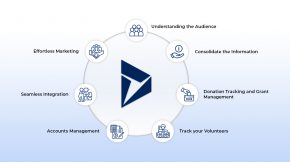What Can Business Central for Healthcare ERP Do for Your Medical Practice?
Balancing patient care and the administrative tasks behind it is an everyday challenge for anyone in the healthcare sector. The shift from providing quality care to dealing with inventory and supply chain issues, complex billing cycles, and compliance requirements can be challenging. These operational concerns can easily drain resources from the core mission, which is patient care.
What impact could a streamlined operations have on your healthcare organization, not for the sake of savings, but in fundamentally improving your capacity for care? This question is answered through the use of Microsoft Dynamics for healthcare industry, and more specifically, the use of a tailored Enterprise Resource Planning (ERP) solution.
Healthcare Operational Challenges
Healthcare is distinct from other industries as the stakes involved are higher as is the care regulation while the supply chains are time critical. Perhaps some of the notable challenges include:
- Disjointed and Manual Processes – With the use of siloed software, paper charts, and spreadsheets, inefficiencies and errors occur in inventory, scheduling, and billing.
- Inventory Blind Spots – There are inefficiencies relating to both overstock and stock out due to the difficulties in tracking pharmaceuticals, medical supplies, and equipment multisite.
- Financial Management is Complex – Patient billing, insurance claims, reimbursements, and multi-channel revenue cycles are complex and subject to delays.
- Compliance Demands are Rigid – Data security and audit trails must be exacting as organizations are required to comply with HIPAA, GDPR, and other data security policies.
Why Specialized Healthcare ERP Is the Prescribed Remedy
A generic tool won’t work. The healthcare sector requires a solution tailored to its needs. The Business Central healthcare ERP system provides the administrative team with a sophisticated diagnostic and treatment tool. Unlike other systems, Business Central for Healthcare is built to integrate and automate key processes and give a single system of record for the entire organization. The benefits are discussed below.
From Charting Chaos to Operational Clarity
1. Unified Financial Management and Streamlined Billing
The “revenue cycle” functions as the financial core of any healthcare organization. The Dynamics 365 Business Central for healthcare integrates financial data with operational data. This develops a holistic platform where patient invoice management, insurance claims, and profitability tracking all happen in concert. Healthcare providers report improved cash flow due to the automated billing and denial management. Such deep integration is a defining feature of any good Business Central healthcare ERP.
2. Intelligent Procurement and Inventory Management
Healthcare Business Central Platform offers full transparency of your inventory. You can monitor and control pharmaceuticals, medical supplies, and equipment in clinics, warehouses, and even in operating rooms. Set up automatic reordering to eliminate stockouts, reduce the disposal of expired stock, and get the best return on your inventory. This level of inventory management is vital for the healthcare industry, not only to manage costs but also to ensure patient safety.
3. Advanced Regulation Compliance and Data Security
The patient information is critical and protected. Dynamics 365 Business Central for Healthcare apps are built on a compliant and secure Microsoft Cloud platform. HIPAA and other healthcare regulations are addressed with strong user access controls, data encryption, detailed audit trails, and secured data sharing, all of which are part of the risk management features. Patient and risk information is more protected than ever as the security framework makes sure that users have access to patient information only if they are authorized to see it.
4. Data-Driven Decision Making
Intuition alone won’t suffice these days—you require data. Microsoft Dynamics for healthcare industry excels in converting operational data into actionable insights. The built-in dashboards and Power BI integration enable administrators to monitor essential KPIs such as patient wait times, resource utilization, treatment costs, and revenue per provider. Such insights enable the healthcare leadership to make decisions that improve patient care and business operations.
5. Enhanced Patient Care and Staff Efficiency
Ultimately, the purpose of technology is to assist. When the related technology in use helps to reduce paperwork as much as possible, staff get to devote more time to patients. Additionally, streamlined backend operations result in simpler patient scheduling, more accurate billing, and faster service, all of which are strongly correlated to patient satisfaction. The benefits brought by a Business Central healthcare ERP alleviate the burdens of both the staff and the patients, leading to improvements in their overall experiences.
Meeting HIPAA Standards: A Unified Task, A Distinctively Enabling Collaboration
When we talk about implementing a new system like Business Central in healthcare sector, the question isn’t just “Will this make us more efficient?” It’s also “Will this keep us safe and compliant? The answer is yes, and here’s why—it’s built on a foundation designed for this very purpose. In meeting HIPAA standards, a cloud service provider, like Microsoft, are the parties responsible for meeting such standards together.
- The Responsibilities of Microsoft: The physical global datacenters as well as the underlying network and hardware infrastructure are part of the cloud that needs to be protected. The platform should also be resilient and secure. The cloud services, including Azure platform, that power Business Central, have undergone rigorous independent audits and are certified to meet a wide array of global standards, including HIPAA.
- Your Responsibilities: Security in the cloud is your responsibility. This entails ensuring that your Business Central environment is properly configured, managing user access and permissions, and ensuring that your employees use the system in a manner that safeguards patient data.
Compliance With Regulations in Your Industry
Healthcare organizations must adhere to various regulations, the most important being HIPAA, HITECH, Omnibus Rule, and other applicable state laws. Your implementation partner needs to understand these laws so that, while, for instance, customizations and third-party integrations are designed and other functionalities are being built, compliance is not jeopardized.
Secure Configuration and Implementation
The business logic, user interface, and workflows must be set up in such a way as to reduce risk to PHI. These include, but are not limited to, minimum necessary data display, separation of duties, and least privilege access. Diagnosis codes are not to be shown to personnel not entitled to see them, and certain roles are also restricted from printing sensitive documents. This also includes securing the database and Business Central environment and the system integration.
Training and Change Management
User and administrative training are required so that the knowledge is transferred to all staff operating and supporting Business Central. This is to ensure that the system is used correctly, securely, and in a compliant manner. Due to high employee turnover in healthcare, training needs also must be addressed on an ongoing basis.
A New Prescription for Healthcare Management with Microsoft Healthcare Cloud
Business Central for Healthcare gives you effective tools that comply with necessary provisions, while your team and the implementation partner, such as Beyond Key, use them properly. That is why Beyond Key Combines Their Expertise with HIPAA Compliance to Ensure end-to-end security. Following best practices of security extends to working with partners who are aware of rules and regulations governing the industry. Implementation partners like Beyond Key play a critical role in the success of the deployment. This ensures that the Business Central environment won’t only be compliant and secure, but also fulfills healthcare organization’s requirements.
Secure Business Central for Healthcare implementation
Beyond Key implements Business Central for Healthcare with security and compliance in mind. Their familiarity with the shared responsibility model allows them to avoid the one-size-fits-all approach to Business Central activation in favor of tailoring it to address client-specific security and compliance challenges. Our proactive approach augments the security controls within the Business Central environment. Notable examples are continuous monitoring, incident response, and layered approach.
- Help in designing and deploying appropriate role-based security profiles geared towards your business processes
- Setup of audit policies in line with compliance reporting requirements.
- Training on data handling policies as well as user training to transform your team into a cyber security asset.
The Evidence is Clear: Why You Should Modernize Now
The move toward integrated cloud systems is not expensive; it is a matter of strategy. Microsoft Dynamics for healthcare industry provides a Centralized Cloud-enabled system that can be accessed and managed remotely.
- A recent Gartner study reveals that organizations that integrate ERP systems and other business applications report a 23 percent reduction in operational costs.
- The Aberdeen Group stated that companies that have automated supply chains report a 22 percent increase in gross profit margins year over year.
- An article in the Journal of the American Medical Association highlighted that administrative complexity accounts for nearly 30 percent of all healthcare spending in the U.S., which is a strong indicator that there is an opportunity available for efficiency.
Moving Forward: Collaborate with Beyond Key for a Smooth Implementation
A new software system is always a challenge to implement. However, with our team, you will not face this challenge alone. Appropriate implementation and customization of Dynamics 365 Business Central for Healthcare to your unique business processes is the only way to enjoy its true benefits. Beyond Key isn’t just a tech company; they are healthcare business specialists and a trusted Microsoft Partner. They understand your world because they’ve helped so many others in it. We will walk alongside you to:
- Map your specific challenges and goals.
- Thoughtfully implement and customize your Business Central healthcare ERP to fit like a glove.
- Ensure it talks perfectly with your existing clinical software.
- Provide truly helpful training and support so your team feels confident and empowered.
You started your career in healthcare to make a difference. Let us help you remove the barriers so you can do more of what you love.
Ready to build a more secure, efficient, and compliant healthcare practice with? Talk to a Beyond Key Security Specialist Today.












